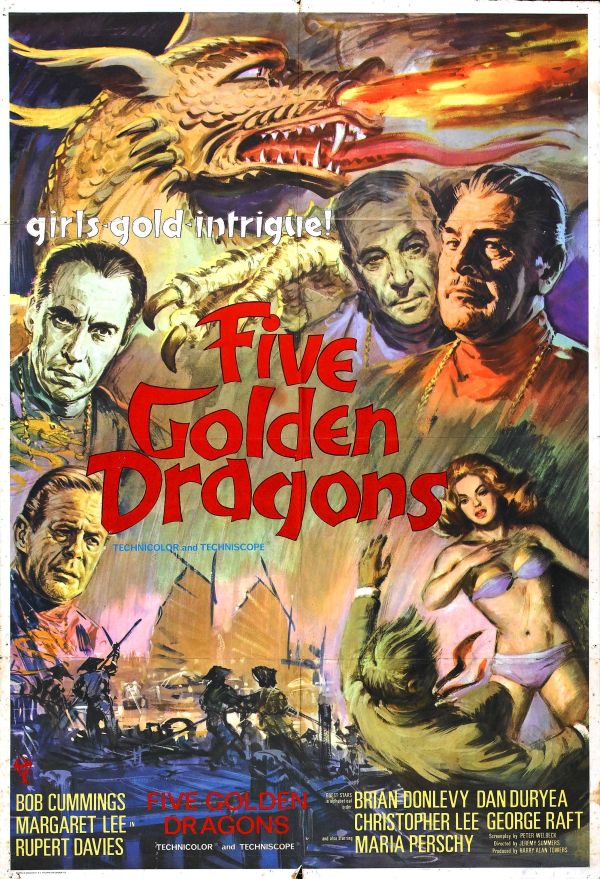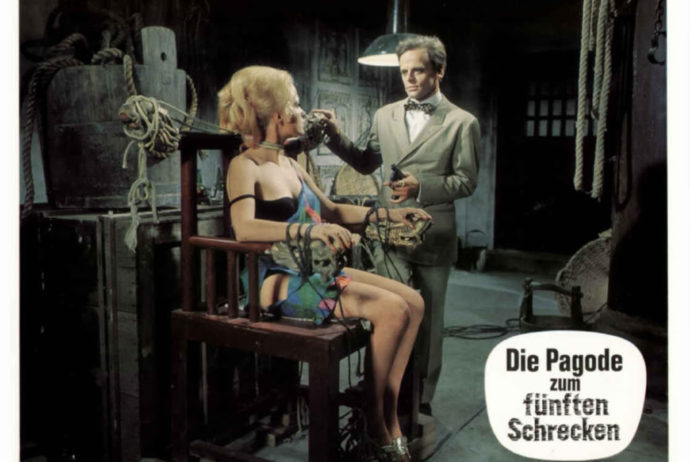Dir: Jeremy Summers
Star: Bob Cummings, Rupert Davies, Maria Rohm, Klaus Kinski
It’s probably important to realize that this is a spoof as much as any kind of serious thriller. The comedic elements come mostly in the shape of Bob Mitchell (Cummings). He’s an American playboy who gets embroiled in things after he’s the recipient of a note referring to the titular gold-smuggling group, from a man who then takes a swan-dive from the penthouse of an apartment complex in Hong Kong. This brings him to the attention of the local police, in particular, District Commissioner Sanders (Davies), who has been tracking the group for a while, unable to figure out all their identities. When stewardess and gang courier Ingrid (Rohm) is kidnapped, Mitchell rides gallantly to the rescue, a route taking him through the night-club, filled with secret passages, which is the Dragons’ base.
I kept expecting Mitchell to reveal his true identity as an Interpol agent or something, but it never happens – he’s exactly the same, gently gormless gentleman he pretends to be, even if his background story mutates with every telling. Which makes the issue of why he’s the recipient of the note even stranger, since there’s no reason for the plummeted victim to have made sending Bob a clue, his last meaningful act rather than, say, sending it directly to the police. But let’s face it, this is less a rigorously-plotted crime thriller than a fizzy little jaunt, intent as much on showcasing Hong Kong and its tourist attractions as anything else. There’s no other way to explain the amazingly sedate pace of a rickshaw chase; seriously, both parties would have been better off hopping out and ambling on at a moderate speed.
Must admit, as a time capsule of mid-sixties Hong Kong, it works pretty well, featuring now-gone landmarks like the Tiger Balm Garden, with its iconic Tiger Pagoda, as well as some still extant, such as the Jumbo Kingdom Floating Restaurant in Aberdeen Harbor. I suspect my dad, who was posted to Hong Kong for his fifties’ National Service in the RAF, would probably have got a kick out of the location work here. It’s likely wise for the film to try and provide as many distractions as possible from the weak storyline, even if this means resorting to cringe-inducing puns. For instance, after Bob is flipped, kung-fu style, by Ingrid’s sister, and she asks “You are a Dragon, aren’t you?”, he replies painfully, “It’s not only dragging, I think it’s broken.”
 The parade of guest stars seems to solve a similar purpose. The Dragons are a strangely Caucasian lot, considering where they’re operating, being played by Dan Duryea, Brian Donlevy, George Raft and Christopher Lee, which is an impressive supporting cast. Or would be, if they were given anything meaningful to do. Instead, they get little more than two scenes, shot suspiciously indoors (particularly compared to the rest of the film, which flaunts its Hong Kongness with blatant abandon), so you wonder if they even got a weekend in the colony out of it. I think the appearance of Japanese guest singer Yukari Ito also falls into this category, apparently a shallow and rather obvious early stab at the international box-office.
The parade of guest stars seems to solve a similar purpose. The Dragons are a strangely Caucasian lot, considering where they’re operating, being played by Dan Duryea, Brian Donlevy, George Raft and Christopher Lee, which is an impressive supporting cast. Or would be, if they were given anything meaningful to do. Instead, they get little more than two scenes, shot suspiciously indoors (particularly compared to the rest of the film, which flaunts its Hong Kongness with blatant abandon), so you wonder if they even got a weekend in the colony out of it. I think the appearance of Japanese guest singer Yukari Ito also falls into this category, apparently a shallow and rather obvious early stab at the international box-office.
At least Klaus gets to do a bit more than mot of the guest stars in his role as Gert, particularly in the early going, where he’s the Dragons’ main enforcer, though never gets his sweaty hands on Bob. He certainly made it out to Hong Kong, and is seen whizzing around a number of the landmarks wearing an elegant bow-tie. Because, as we all know, bow-ties are cool… However, he takes more of a back-seat in the second half, with the focus split, roughly equally, between Mitchell on the one hand, and Sanders plus his side-kick, Inspector Chiao (Roy Chiao) on the other. Though the last named is actually a refreshing change, being at least the equal of Sanders in terms of overall competence, and is a Chinese actor in a role where his race is largely irrelevant. You didn’t see that very often in this era.
Kinski’s presence does seem to be an attempt to tie this production into the Edgar Wallace market – also to that end, DC Sanders was a character originally created by Wallace, though never a significant part of the crimi films in which Kinski starred. But no harm in spreading the funding net as far as possible, I guess. Under other circumstances, the romantic tension between Bob and Ingrid could have been creepy more than anything, especially by modern standards – at the time this was made, Cummings was in his late fifties, and Rohm barely in her twenties. But the film wisely decides to play the hero as perhaps even more naive, and he does have a certain goofy charm.
This was produced by Harry Alan Towers, a legendary producer who, earlier in the sixties, had jumped bail and fled America after being charged with running a vice ring. This might help explain why he seemed to get on well with Kinski, using Klaus in seven films produced between 1966-70. Towers was a fascinatingly dodgy character – not the kind of guy from whom you should accept an IOU, who was also alleged to have provided compromising information on people to the Soviets, and married Rohm, who appeared frequently in his movies.
Like most of his productions, this is no great art, yet equally clearly doesn’t have any pretensions in this department, which makes it somewhat immune to criticism. This is more a thin excuse than a story, a front for footage of exotic foreign locations, and names you will probably recognize from far better movies. That said, it kept me more entertained than some, even if Kinski is (as was generally the case in his supporting roles) not used to his best effect. At least he has plenty of company in that department for this production, alongside the similarly under-utilized Lee, Raft, etc.
